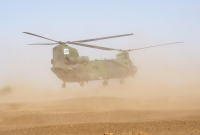Support strong Canadian climate journalism for 2025
A Canadian pledge of 200 soldiers for peacekeeping missions is missing in action more than 18 months after it was first made to the United Nations by Prime Minister Justin Trudeau.
The "quick-reaction" force was one of the signature promises Trudeau made to the UN during a major peacekeeping summit in Vancouver in November 2017, along with a unit of helicopters and a transport plane.
Canada delivered on the helicopters, which have been conducting medical evacuations in Mali since last August and are close to wrapping up their mission.
And UN and Defence Department sources, who aren't authorized to discuss it publicly, say an agreement is being finalized on deploying the transport plane to ferry supplies and troops around Africa, with the hope that flights will start as early as next month.
But Canada has yet to register the quick-reaction force in a UN database of peacekeeping pledges, which is normally the next step countries take after making a commitment — meaning it has not been formally offered to the UN.
That is despite the prime minister's promise and a call by the UN for such units, which are responsible for responding quickly to emergencies such as an attack on fellow peacekeepers or civilians.
The quick-reaction force was "intended as the last of a series of pledges that are being delivered consecutively," Defence Department spokesman Daniel Le Bouthillier said in an email on Tuesday.
The military is focused on the helicopter mission in Mali, he added, and the quick-reaction force will be made available "when it becomes appropriate."
The fact the force has not been entered in the UN database "does not mean that we don't intend on fulfilling that pledge," said Defence Minister Harjit Sajjan's spokesman Todd Lane, who indicated the government has given itself until November 2022 — five years from the Vancouver summit — to fulfil all three signature pledges.
Yet the UN in May listed quick-reaction forces as one of several "critical" requirements needed for peacekeeping missions around the world, saying they were needed to protect civilians and facilitate aid delivery.
Such units have been deployed in recent years to the Democratic Republic of Congo and the Central African Republic, where they have clashed with different armed groups as the UN has sought to provide security and stability.
Walter Dorn, a peacekeeping expert at the Canadian Forces College in Toronto, said there is a sad irony in how long it has taken for the quick-reaction force to materialize — or even get registered in the UN's database.
And with Canadians set to go to the polls in the fall, Dorn worried it might never be formed "because we do not know who will be next in power after the October election."
The lack of movement on the quick-reaction force is another broken promise by the Liberals when it comes to peacekeeping, Conservative defence critic James Bezan said Tuesday.
"Trudeau came to power saying 'Canada is back,' largely meaning that we're going to be back at the UN in a major way," he said. "But it's just broken promises and platitudes rather than actual boots on the ground on UN missions."
As for what a Conservative government would do on peacekeeping, Bezan said it would push for a UN force in Ukraine, but otherwise take "a hard look at what commitments we have and which ones we should be doing."
While the federal Liberals campaigned in the last election on a promise to renew Canada's commitment and role in peacekeeping in a major way, Dorn said those promises have so far fallen short.
"In practice, the only major activity that we've had showing for peacekeeping in terms of deployment of our uniformed personnel is the Mali mission," he said. "Canada's rhetoric is far more pronounced than the reality."




Comments